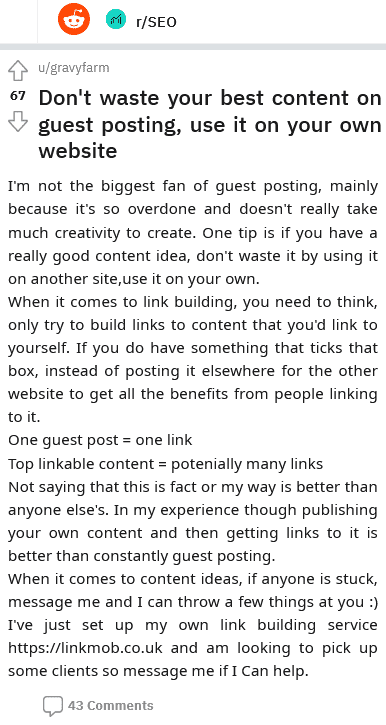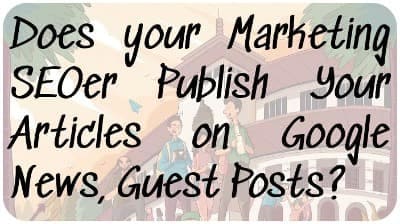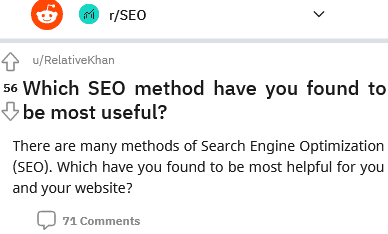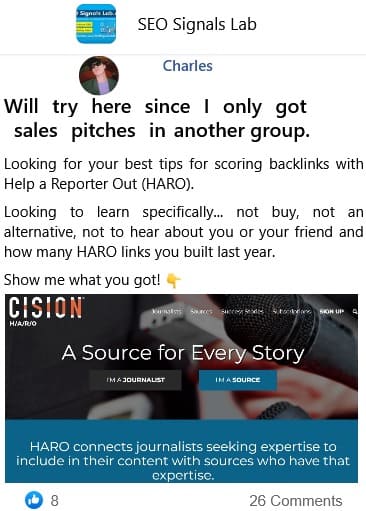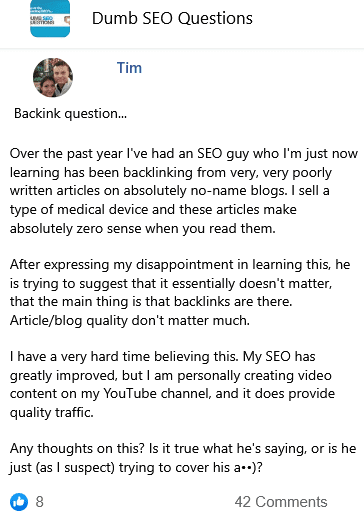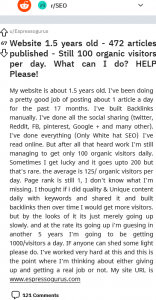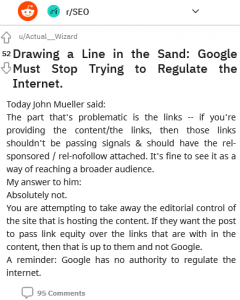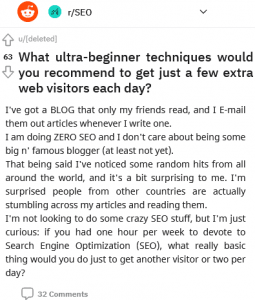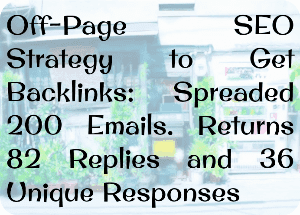How to Get Authority Backlinks with Cold Email Outreach (23% Response Rate )
I use a "relationship first" approach to link building that works like a charm. Most cold email templates for link building suck. They don't offer value, and use a "me first" approach, which is why most of them go in the trash. If you want to score links from authority sites, you have to stand out from the crowd in order to avoid the trash bin.
On average, my outreach campaigns get an 80% open rate and 23% response rate (stone cold emails to authority blog owners).
This strategy even worked on Ryan Stewart, the owner of Webris. I wrote a post for his blog and linked to my website and my client's website. He has links from Neil Patel, Brian Dean (Backlinko), Ahrefs , Moz, Search Engine Land, Authority Hackers, and more.
How to Get Powerful Editorial Backlinks
Now that you understand why this is definitely the move, let's go over how to secure editorial backlinks.
1. Determine Your Objective
First you have to figure out what page you want to rank.
Let's say your website is about fishing, and you want to rank your page about fishing rods.
If your target keyword is "best fishing rods under 300 dollars", you're probably going to want to get links from fishing websites – that's obvious. But you can also secure links from websites that are topically relevant like hunting and outdoors websites.
Either way, for this example we'll say we want links from other fishing websites. Let's target websites with at least a Ahrefs Domain Rating (DR) and 5,000 organic traffic on Ahrefs .
Next, decide how many links you want. If you decide you want to build 5 super high quality links, you should probably send 100 emails.
We can normally pull off 15-20 replies minimum per 100 emails sent, but you're new to this – assuming you're going to suck because it's your first time, you can definitely get 5 responses per 100 emails.
That's only a 5% response rate, which is bad. Worst case scenario you get 5 replies, but you may very well get more if you send good emails.
Anyway, you need to make a list of 100 websites in your niche that fit your criteria in terms of size and strength. The size and strength of the website is up to you, but more powerful websites are obviously better.
2. Find Your Targets
With your list of 100 websites created, you need to figure out who the owners are so you can reach out to them.
You can usually figure this out via their about or team page, but sometimes you have to dig a bit deeper. Searching Google for "company name" + "owner" or "company name" + "founder" is usually going to do the trick.
Using LinkedIn is also a great way to figure out who your point of contact should be.
Figure out who the owner is, get their name, get their personal email (name@company.com, not contact@company.com) and send them a nice personalized note.
If it's a fishing website, don't say, "I love your fishing articles."
That's not personalized – you could send that 'personalized' note to literally anyone with a fishing website.
Instead, say, "I love the tip you gave about how you can catch more catfish. I used that trick and had x result…" and you want to even name the trick.
I just used a generic example, but be very specific and send them a personalized note and it's going to make them like you a lot more.
You have to understand that they don't care about you.
They don't care about your posts.
They only care about themselves.
If you can compliment them, boost their ego and make them feel important, they will be much more likely to respond to you.
3. Send The Pitch
Next thing you're going to do is offer value, but I'm not talking about money.
When I say offer value, I mean offer them help in some way, shape or form.
This can be really anything – any tip or trick you have for them will do, as long as it helps them.
Since I work with websites, I normally will find a problem with their website and I'll let them know about it.
Then I offer to send over some tips to help them fix it and they normally say, "Hell yeah, I want you to help me fix my problem. What is it? How can you help me?"
They're eager to reply because I'm offering to help them, not the other way around. There's a lot in it for them, and not much in it for me.
Next, I'll help them fix a problem with their site like I said, but I don't actually fix anything. Honestly. I'm not their web developer.
All I do is I send them a quick two or three minute YouTube video or screen recording with Loom, and I explain some concept to them that's very basic and just send them some resources.
The point isn't to actually fix their website, the point is to get them to LIKE you!
If they like you, it's pretty much game over.
And that brings us to step four:
4. Build a Relationship
Think about it this way:
Anyone who owns a website that's worth getting a link from is going to have a lot of people sending them emails asking for links.
That means they're going to get 20 emails a day, at least, all of which are people asking them "Hey, notice you have a page in your blog about this topic, would really appreciate a backlink, you mind linking to me?"
They get that all the time and they hate it. It's boring. There's nothing in it for them.
No one ever takes the time to give a damn about them.
But if you actually take some time to give a damn about them, they're going to give a damn back. Pardon my French, but that's how it is.
5. Secure The Link
At this point, you've sent an email with a unique, genuine compliment, you've helped them out, and gotten them to like you. Now you can say:
"Hey, by the way, if this helped you out, I'd really appreciate a link from you because it'd really helped me out. Could you just slip a link in there for me? I'd really appreciate it."
99% of the time people are going to say yes, especially because you did them a favor. They're going to feel like they're in your debt and they have to repay you for the favor you did them.
In the book Influence (awesome book to read if you're interested in sales), he talks about this concept in detail.
Basically, if you do someone a favor – especially an unprompted favor – the recipient will feel like they're in your debt and must return the favor.
If you want, you can even offer the link in exchange for advice in the initial email, as long as you're offering them something good.
Most people will happily insert a backlink if you help them speed up their website. After all, it takes them a minute to do, and they're getting a lot of value in return.
Conclusion
I use this exact process to secure insanely powerful links for my clients week after week, month after month, at scale.
Hopefully you can implement this strategy to improve your own link outreach campaigns!
25 💬🗨
📰👈
Interesting approach but a few things don't make sense to me.
80% open rate? That seems high for any campaign. What's the angle of the subject line?
Also if you're personalizing every email and finding errors on their site for them , that takes a lot of time when you're doing 100 sites. How do you call this scalable?
80% open rate is combined – I send 2 emails, an initial email and a "bump" (short email like hey making sure you saw this or something) but the subject line is highly personalized and grabs attention. I've used my experience creating high Click Through Rate (CTR) SEO titles to create good subject lines.
The good subject, using their first name and opening with a highly personalized first line all shoot open rate through the roof. (They see a preview of the opening lines of email next to subject line)
As far as the scalable part, yes, it does take time to do it all yourself (nothing worth doing is easy)
But my team is highly trained for each part of the process, instead of one person doing everything. It's like an outreach email assembly line if you will, so I can do this at scale. Would be hard to do it at scale starting out but it's possible.
Still, Return of Investment (RoI) of this is huge if you do it yourself, I'm sure you know the value of a highly relevant authority backlink
I've used my experience creating high CTR SEO titles to create good subject lines.
I think the real golden nugget is hidden in here. Care to share an example and why it works?
tuwinerseo ✍️
Well it really depends on the industry. Across all industries I've found that some extremely generic subject lines work such as "Quick question". But in other industries, more personalized subject lines work. I test different email subject lines until I hit the 80% mark and scale it up.
I'd highly recommend using () in your subject line just like you would in an SEO title to increase CTR, and use their first name/company name as well.
Subject line goals:
• Convince them to open the email
• Don't convince them not to open the email
• Don't send a misleading subject line
That's pretty much it
smiley44
whst does "using ()" mean? you use parentheses? can't I've ever seen this in page titles.
tuwinerseo ✍️
Yep, parentheses. Brian Dean from Backlinko did a study that found using () in Search Engine Optimization (SEO) titles helps with Click Through Rate (CTR).
I'm not talking about the H1 tag on a page, I'm talking about the <title></title> tag that is displayed in Google. For example:
3 Best Gaming PCs Under $500 (2020 Updated)
smiley44
Great tip! I'm just Happy that the pipe delimiter is falling out of fashion. :)
Taps2Figues
Hi,
Thanks for the great tips!
I am in a position in which I cannot allocate budget to linkbuilding, so I am going to start outreach by myself. I'd like to make a dozen quality backlinks in 2020.
I have 2 questions :
• You mentioned Ahrefs , do you have any free tools or any advice about I can build a high/average Domain Authority (DA) websites list in my area? The "website scouting" seems to be a very time consuming activity to me.
• Do you use an emailing tool (like mailchimp) for emails, or send directly from your email client (which might make the email feel more personalized)?
Thanks again for the tips!
Cheers.
It is time consuming but worth the investment. Using Ahrefs is a crucial part of my process, but you can use other SEO tools if you like. I don't necessarily recommend Ahrefs as a necessity for keyword research, but it's incredibly useful for competitor research and analyzing the strength of websites.
DR is honestly an arbitrary number in most cases, because it's a number created by 3rd party tools and not Google. However, it's still a good number to gauge relative strength, as long as you also factor in their actual backlink portfolio (has good links, not spam) and real traffic (look at the keywords they're ranking for – do they pull in real organic traffic? Are their keywords relevant to your site?)
Relevance and organic traffic I'd say are more important than DR. If a website is pulling in a ton of traffic from Google, who cares about DR – Google obviously trusts them as a source of good information. Why wouldn't you want a link from a good source?
One of my clients has a website that's a 3. Ahrefs Domain Rating (DR) (I'm the first guy he's ever hired to do link building, and first link building effort ever actually) but before just focused on high quality content and got himself to 54.4K organic traffic according to Ahrefs (his real number is much higher)
Link building isn't essential – if you put out good content, you'll rank and gain links naturally. However, building authority links will definitely speed up the process and will help you rank for more competitive keywords.
I use MixMax and Google Sheets to power my outreach campaigns. MixMax is a premium tool ($39/month per email) but it has a great User Interface (UI) so is worth it to me.
Hope this helps
Thanks, it's very helpful!
📰👈
A Secret to get High DA Backlinks You Should Bookmark!
High Authority Sites Share my Website Links but put it on No-Follow. Obsolete Whitehat Way!
Why Does The First SERP Usually Contains High Domain Authority Sites?


